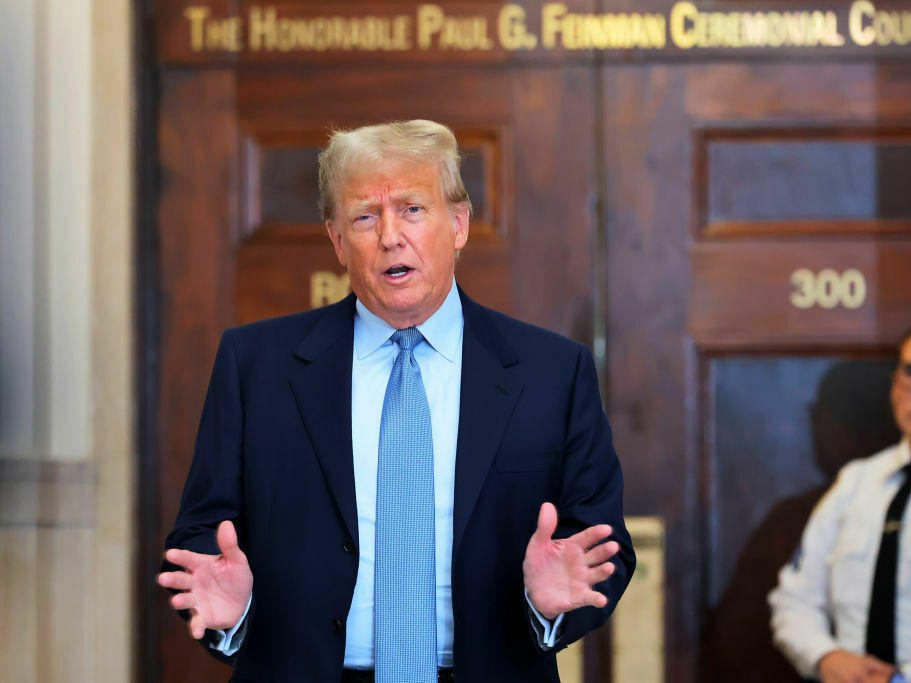Section Branding
Header Content
Trump isn't above the law, Justice Department tells a judge
Primary Content
The Justice Department urged a judge Thursday to reject Donald Trump's bid to dismiss the federal election interference case against him, arguing for the bedrock principle that "no one is above the law."
"He is subject to the federal criminal laws like more than 330 million other Americans, including Members of Congress, federal judges, and everyday citizens," wrote assistant special counsel James Pearce.
Earlier this month, Trump's legal team moved to dismiss four felony charges against him in Washington, D.C., on the ground that he should enjoy presidential "immunity." The Supreme Court has not ruled on such a claim of absolute immunity from a current or former president.
Trump's legal team has suggested that they may seek review of the issue before the nation's highest court, which could also help him win a delay of the trial scheduled for March 4, 2024.
But in their new filing, prosecutors wrote that the legal issue is not a close or complicated one. Rather, they said, Trump mischaracterized the allegations against him and vastly overstated the historical and constitutional support for his claims.
Under Justice Department interpretations, sitting presidents enjoy only temporary immunity from prosecution that ends after they depart the White House, the special counsel team said. To extend such protections to a former president would "effectively preclude any form of accountability for a president who commits crimes at the end of his term of office."
If the court accepts Trump's sweeping arguments, the Justice Department said, it would shield presidents who take bribes in exchange for lucrative federal contracts for their family members; presidents who instruct the FBI to plant evidence on political adversaries; and presidents who sell nuclear secrets to foreign rivals. The logic is particularly troubling in a president's second term, the special counsel team wrote, when a president no longer needs to face voters in another election, removing yet another check on his behavior.
"Immunity from criminal prosecution would be particularly inappropriate where, as here, the former president is alleged to have engaged in criminal conduct aimed at overturning the results of a presidential election in order to remain in office," assistant special counsel Pearce wrote in the filing late Thursday.
The indictment handed up by a federal grand jury placed Trump at the center of a conspiracy to overturn the election results and exploit an atmosphere that led to the storming of the U.S. Capitol on Jan. 6, 2021, injuring more than 140 law enforcement officers. Trump stands accused of conspiring against the government he once led and of violating the civil rights of millions of American voters. He has pleaded not guilty.
"Breaking 234 years of precedent, the incumbent administration has charged President Trump for acts that lie not just within the 'outer perimeter,' but at the heart of his official responsibilities as President," wrote Trump attorneys John Lauro and Todd Blanche in their Oct. 5 motion to dismiss the election interference case. "In doing so, the prosecution does not, and cannot, argue that President Trump's efforts to ensure election integrity, and to advocate for the same, were outside the scope of his duties."
In his bid to dismiss the case, Trump's lawyers argued that no other American president had faced federal criminal prosecution, putting history and tradition on the side of presidential immunity. But prosecutors said it may be that Trump's unprecedented legal problems could simply reflect his unprecedented behavior. In all, he faces criminal charges in four separate jurisdictions: Florida; Fulton County, Georgia; New York; and Washington, D.C.
Lawyers working for special counsel Jack Smith cited the words of prominent conservative legal thinkers and Republican lawmakers during Trump's impeachment, including Sen. Mitch McConnell, R-Ky., who said only weeks after the Capitol siege: "We have a criminal justice system in this country. We have civil litigation, and former presidents are not immune from being held accountable by either one."
Copyright 2023 NPR. To see more, visit https://www.npr.org.

